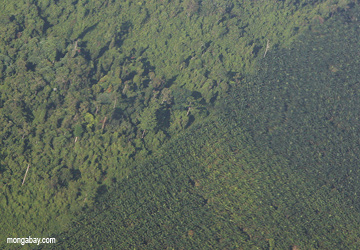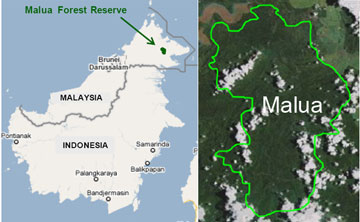Investors seek profit from protecting rainforest biodiversity
Private equity seek profit from rainforest wildlife conservation
Rhett Butler, mongabay.com
August 13, 2008
Scheme would generate investment returns while restoring rainforest and protecting wildlife
An investment firm has launched the first tropical biodiversity credits scheme.
New Forests, a Sydney, Australia-based company, has established the Malua Wildlife Habitat Conservation Bank in Malaysia as an attempt to monetize rainforest conservation.
The “Malua BioBank” will use an investment from a private equity fund to restore and protect 34,000 hectares (80,000 acres) of formerly logged forest that serves as a buffer between biologically-rich forest reserve and a sea of oil palm plantations.
The conservation effort will generate “Biodiversity Conservation Certificates”, the sales of which will endow a perpetual conservation trust and produce a return on investment for the Sabah Government and the private equity fund.

Oil palm plantation and logged-over forest in Sabah, Malaysia on the island of Borneo near Malua. |
New Forests believes the certificates — each of which represents 100 square meters of rainforest restoration and protection — will be purchased by companies looking to bolster their environmental credentials for the marketplace. Customers are expected to include oil palm producers and forestry companies.
“Energy, food and cosmetics companies relying on agribusiness products, particularly palm oil, are increasingly scrutinized for perceived impacts on rainforests,” said New Forests in a statement. “By purchasing certificates, buyers can claim a transparent and credible contribution to high value forest conservation.”
“Nothing like this has ever been done for the biodiversity in tropical rainforests,” added David Brand, Managing Director of New Forests Pty Limited, the parent company of New Forests Inc. “The Malua BioBank translates rainforest protection into a salable product so that biodiversity conservation can compete with oter land uses on a commercial basis.”
 How does the Malua BioBank work? The Sabah State Government has licensed conservation rights for a period of 50 years to the Malua BioBank and a private investo has committed up to US$10 million for the rehabilitation of the Malua Forest Reserve over the next six years. The Malua BioBank will sell Biodiversity Conservation Certificates, with each certificate representing 100-square meters of rainforest restoration and protection. Revenues generated from the sale of Biodiversity Conservation Certificates will be used to recover costs incurred and to endowa trust fund (“Malua Trust”) set up to manage the long-term conservation management of the Malua BioBank over the remaining 44-year period of the license. Any profit will be shared between the forest management license holder (Yayasan Sabah, a foundation established by the Sabah Government to improve the livelihoods of local citizens) and the Malua BioBank investor. Progress toward key management goals and priority actions outlined in the Conservation Management Plan will be reviewed annuall by a Steering Committee (composed of members of the Sabah Government and the Malua BioBank) and by an Advisory Committee (composed of local and international NGOs and scientists). In addition, the management of Malua as part of the Ulu Segama-Malua Forest Reserve will be regularly assessed against the FSC (Forest Stewardship Council) standard with the aim of achieving and retaining certification. FSC is an independent, non-governmental and not-for-profit organization established to promote the responsible management of forests. The FSC standard covers environmental, social and technical issues. The Sabah Government has committed to halting logging in the Malua Forest Reserve for at least the next 50 years. This contractual agreement commits the Sabah Government to implementing the Conservation Management Plan under the monitoring f the Malua Trust, which will be funded through a portion of the revenues from Biodiversity Conservation Certificate sales. Any breach of the Malua BioBank agreement entails significant financial penalties that include the repayment of all funds inveted in conservation management as well as the refund of all the Biodiversity Conservation Certificates sold. Box text courtesy of New Forests. |
“We are seeing companies becoming increasingly interested in contributing to rainforest conservation in a way that is meaningfuland financially sustainable,” said Gerrity Lansing, President of Equator Environmental. “The Malua BioBank provides them with a transparent and cost-effective way of doing this.”
New Forests says that it hopes the sale of biodiversity credits will boost conservation where government efforts and philanthropy have fallen short.
“To date, public and philanthropic funding sources for conservation have not kept pace with the rate of biodiversity loss,” said New Forests. “Attaching value to conservation will harness private sector finance to help fill this funding gap.”
Restoring biodiversity
To generate credits by restoring biodiversity in Malua, New Forests says it will focus on initiatives to help the rainforest canopy recover from past logging and introduce measures to reduce the risk of catastrophic wildfires.
“The rehabilitation process will include planting seedlings to reestablish key rainforest species and enhancing natural food reources for wildlife until the area regenerates into healthy tropical rainforest,” explained New Forests. “Regular monitoring of forest regeneration, water quality and wildlife are just a part of the comprehensive conservation strategy. The Malua BioBank will also work with local communities and landowners to uphold the prohibition against hunting within the reserve and to prevent illegal logging.”
“The ultimate aim of the Malua BioBank is to shift land use towards rainforest restoration and preservation, catalyzing a new economy of conservation in the process,” New Forests continued. “Once an area has established an economic framework to support long-term sustainable use, money can be moved to other critical conservation areas to initiate the process again. In this way, the Malua BioBank model can act as a stepping stone toward the long-term preservation of high biodiversity areas throughout a region or country.”
Other “ecosystem services” projects
The wildlife banking deal comes shortly after New Forests unveiled an “avoided deforestation” investment in an area of rainforest on the island of New Guinea. The conservation initiative would generate carbon credits that will be sold in voluntary markets to firms and individuals looking to offset their CO2 emissions.
This year has also seen London-based Generation Investment Management — Al Gore’s investment firm — take a minority investment stake New Forests.







